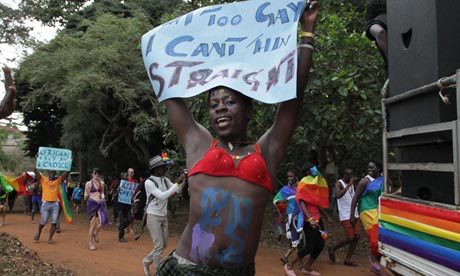Patience Akumu has written about the lives – and deaths – of gay activists for five years in the Kampala Observer. Here she explains how a deep-rooted discrimination blights her country
Uganda's first gay pride parade and celebration at the
Entebbe Botanical
Gardens, Kampala in August 2012.
(Photograph: Rachel Adams/EPA)
I never meant to write about gay rights in Uganda. The issue just crept up on me as I got lost listening to the cries of battered women and holding the hands of dying children.Read the rest here.
These faceless, mysterious, ominous homosexuals tagged at my skirts and beckoned my heart to look their way. I looked for a moment and knew it would be cruel to turn away again. I never meant to give up the possibility of a lucrative career in the law just to be an advocate for the accursed and rejected – and to be accursed and rejected myself. I never meant to spend two hours before my computer, thinking of ways to explain why on earth I meddle with homosexuality just to break the hearts of my kinsmen, disappoint my father and worry my fiancé; to cause my mother and daughter to be pitied.
Homosexuality is illegal in Uganda and in 2009 a bill that suggested the death penalty for certain homosexual acts was tabled before parliament, highlighting the brutal, government-sanctioned discrimination against sexual minorities that blights my country.
I ran into the gay issue at 22, a fresh law graduate and young journalist eager to make her mark and willing to do jobs no other journalist wanted to do. It was a world where it was all right, even heroic, to question the decades-old regime and its ways on other things. If your camera got smashed or you slept in jail for covering a riot, the social media would sing your praise for weeks and proudly share pictures of your defiance.
But heaven help you if you wrote about homosexuals, unless of course you were condemning the havoc they are wreaking on culture and religion. Or "investigating" how they are infiltrating schools, spreading sexually transmitted diseases, causing anal fistulas and forcefully recruiting minors to join a "gay army".
Reporting anything else would immediately cause you to be looked at with suspicion: "Are you gay yourself? Do you need to visit Butabika [mental hospital]? Are white people paying you to do this?"
Yet homosexuality stared us all in the face. A comment here and there from a law don saying it was a human rights issue; a brief newspaper story about a homosexual who had disappeared; a call by a minister who thought homosexuals should leave the country; defiant homosexuals wearing masks and appearing on TV and police threatening to arrest them. Who were these people? For a long time, when I thought of homosexuals I only saw the masks and the innocent-looking boy who was expelled from high school for purportedly being gay.
*****
Comment: This is a remarkable story of courage and conviction. Patience Akumu's position teaches us that taking a stand on real issues is not about being glorified and feted. It is about struggle. And in struggle there are consequences to be paid - often severe consequences that can be life altering.Uganda's position on LGBT rights is unacceptable. More pressure should be brought by the United States - its main western supporter - to change its inhumane laws against gay folk. Sadly, the US only sees Uganda as an ally in the region and a stalwart supporter of its manufactured 'war on terror'.
The United Nations should, however, step into the vacuum and pressure Uganda to respect the human rights of gays. I would add the African Union but that would be wishful thinking at best.
LGBT folk are oppressed on the African continent. Even in countries like South Africa where they enjoy constitutional rights and have access to courts to protect those rights there is hardly a situation that removes them from scorn and worse, harm - often fatal.
Lesbians in particular have been facing the brunt of homophobic attacks in South Africa. There is hardly a week that goes by without a lesbian being attacked and raped, even killed, by heterosexual men or gangs of men bent on making lesbians 'real women'.
This is a horrific situation and a blight on our supposed democratic values.
A couple of weeks ago I read that anti-gay attitudes were more virulent in African countries than sovereign Muslim countries in the so called Middle East. Who would have thought?
But maybe I should not have been so surprised: being gay in Africa is filled with danger and ridicule.
If we are to create democratic states that respect indigenous rights, minority rights, and womens rights it goes without saying that LGBT rights must also be included.
We are, however, nowhere near to accepting this democratic ideal and our collective lives as post-colonial citizens is worse off because of it.
This is a dangerous place to be as Aleksandr Solzhenitsyn warns in "The Gulag Archipelago 1918-1956":
“In keeping silent about evil, in burying it so deep within us that no sign of it appears on the surface, we are implanting it, and it will rise up a thousand fold in the future. When we neither punish nor reproach evildoers, we are not simply protecting their trivial old age, we are thereby ripping the foundations of justice from beneath new generations.”Wise words to heed no doubt.
Onward!

No comments:
Post a Comment